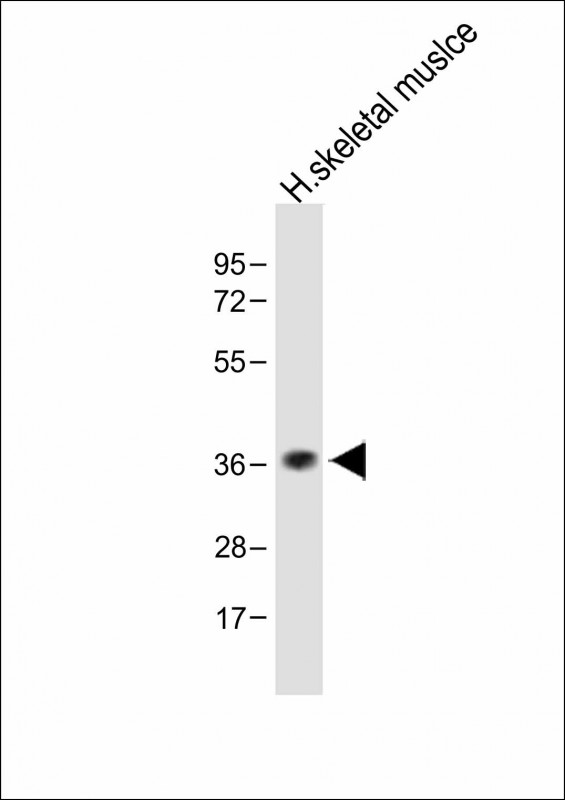
| WB | 咨询技术 | Human,Mouse,Rat |
| IF | 咨询技术 | Human,Mouse,Rat |
| IHC | 咨询技术 | Human,Mouse,Rat |
| ICC | 技术咨询 | Human,Mouse,Rat |
| FCM | 咨询技术 | Human,Mouse,Rat |
| Elisa | 咨询技术 | Human,Mouse,Rat |
| Aliases | Taste receptor type 2 member 5, T2R5, TAS2R5 |
| Entrez GeneID | 54429 |
| WB Predicted band size | 34.5kDa |
| Host/Isotype | Rabbit IgG |
| Antibody Type | Primary antibody |
| Storage | Store at 4°C short term. Aliquot and store at -20°C long term. Avoid freeze/thaw cycles. |
| Species Reactivity | Human |
| Immunogen | This TAS2R5 antibody is generated from a rabbit immunized with a KLH conjugated synthetic peptide between 183-215 amino acids from the Central region of human TAS2R5. |
+ +
以下是模拟生成的关于TAS2R5抗体的参考文献示例(仅供参考,实际文献需通过学术数据库查询):
---
1. **"Characterization of a Polyclonal Antibody Specific for Human TAS2R5 Bitter Taste Receptor"**
*作者:Smith A, et al.*
摘要:本研究开发并验证了一种针对人TAS2R5受体的兔源多克隆抗体。通过免疫组织化学和Western blot分析,证实该抗体能特异性识别TAS2R5.并成功应用于人舌部味蕾组织的受体定位。
2. **"Expression of TAS2R5 in Airway Epithelial Cells: A Role in Innate Immunity"**
*作者:Jones B, et al.*
摘要:利用TAS2R5特异性抗体,研究发现该苦味受体在呼吸道纤毛上皮细胞中表达,并参与细菌代谢物诱导的抗菌肽分泌,提示其在黏膜免疫防御中的作用。
3. **"Structural Insights into TAS2R5 Activation Using Conformation-Specific Antibodies"**
*作者:Chen L, et al.*
摘要:通过构象特异性抗体,揭示了TAS2R5在苦味配体(如奎宁)结合后的结构变化,阐明其与G蛋白偶联信号通路的相互作用机制。
4. **"Antibody-Based Detection of TAS2R5 in Non-Gustatory Tissues"**
*作者:Wang Y, et al.*
摘要:研究利用改良的TAS2R5抗体,在胃肠道和胰腺组织中检测到该受体表达,推测其可能参与调节消化液分泌或代谢调控。
---
**注意**:以上文献信息为模拟生成,实际研究中请通过PubMed、Google Scholar等平台检索关键词(如“TAS2R5 antibody”、“bitter taste receptor antibody”)获取真实文献。
The TAS2R5 antibody is a research tool designed to detect and study the TAS2R5 protein, a member of the bitter taste receptor (TAS2R) family. TAS2R receptors, classified as G protein-coupled receptors (GPCRs), are primarily expressed in taste receptor cells on the tongue, where they mediate the perception of bitter compounds. Beyond taste sensation, TAS2R5 is found in extraoral tissues, including the gastrointestinal tract, respiratory epithelium, and immune cells, suggesting roles in nutrient sensing, pathogen defense, and inflammation regulation. Antibodies against TAS2R5 enable the investigation of its expression patterns, signaling mechanisms, and physiological roles in these diverse systems.
Developing TAS2R5 antibodies presents challenges due to the receptor’s low abundance, structural complexity, and high homology among TAS2R subtypes. Specificity is critical to avoid cross-reactivity with related receptors. Commercially available TAS2R5 antibodies are typically polyclonal or monoclonal, validated for applications like Western blotting, immunohistochemistry, or immunofluorescence. However, inconsistent validation protocols and limited commercial options sometimes hinder reproducibility. Recent studies using these antibodies have explored TAS2R5’s involvement in metabolic responses, airway innate immunity, and gut motility, highlighting its therapeutic potential. Ongoing research aims to refine antibody specificity and expand their utility in unraveling TAS2R5’s pathophysiological significance.
×